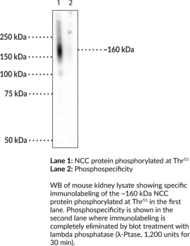Territorial Availability: Available through Bertin Technologies only in France
- Correlated keywords
- FLJ96318 FLJ 96318 Na Cl cotransporter NaCl symporter NCCT SLC12A3 S12A3 slc12a3 Solute carrier family 12 sodium transporters Thiazide TSC WT SLC 12 12A3 A3 Thr SGK STE 20 SPS OSR Xenopus African clawed frog
- Product Overview:
The thiazide-sensitive sodium chloride cotransporter (NCC) is a member of the SLC12 family of transporters and is encoded by SLC12A3 in humans.{46961} NCC is expressed in epithelial cells of the distal convoluted tubule and localizes to the apical plasma membrane where it mediates sodium reabsorption in the kidney. It consists of a central hydrophobic domain with 12 transmembrane helices that contain affinity-modifying residues for sodium, chloride, and thiazides that is flanked by intracellular N- and C-terminal domains with sites that are subject to phosphorylation. Phosphorylation of NCC at threonine 53 (Thr53) is mediated by serum- and glucocorticoid-inducible kinase 1 (SGK1), STE20/SPS1-related proline-alanine-rich protein kinase (SPAK), or oxidative stress-responsive kinase 1 (OSR1). X. laevis oocytes expressing a threonine-to-alanine substitution at Thr53 in NCC, which abolishes its phosphorylation, have reduced chloride deprivation-induced sodium uptake, but not NCC surface expression, compared to wild-type oocytes.{46963} NCC (phospho-Thr53) levels are increased in the kidney by low dietary intake of sodium chloride or potassium in mice.{46962} NCC (phospho-Thr53) levels are also increased in the kidney of the CUL3-Het/?9 mouse model of familial hyperkalemic hypertension.{46964} Cayman’s NCC (Phospho-Thr53) Polyclonal Antibody can be used for immunofluorescence (IF) and Western blot (WB) applications. The antibody recognizes NCC (phospho-Thr53) at approximately 160 kDa from human, mouse, and rat samples.
Cayman Chemical’s mission is to help make research possible by supplying scientists worldwide with the basic research tools necessary for advancing human and animal health. Our utmost commitment to healthcare researchers is to offer the highest quality products with an affordable pricing policy.
Our scientists are experts in the synthesis, purification, and characterization of biochemicals ranging from small drug-like heterocycles to complex biolipids, fatty acids, and many others. We are also highly skilled in all aspects of assay and antibody development, protein expression, crystallization, and structure determination.
Over the past thirty years, Cayman developed a deep knowledge base in lipid biochemistry, including research involving the arachidonic acid cascade, inositol phosphates, and cannabinoids. This knowledge enabled the production of reagents of exceptional quality for cancer, oxidative injury, epigenetics, neuroscience, inflammation, metabolism, and many additional lines of research.
Our organic and analytical chemists specialize in the rapid development of manufacturing processes and analytical methods to carry out clinical and commercial GMP-API production. Pre-clinical drug discovery efforts are currently underway in the areas of bone restoration and repair, muscular dystrophy, oncology, and inflammation. A separate group of Ph.D.-level scientists are dedicated to offering Hit-to-Lead Discovery and Profiling Services for epigenetic targets. Our knowledgeable chemists can be contracted to perform complete sample analysis for analytes measured by the majority of our assays. We also offer a wide range of analytical services using LC-MS/MS, HPLC, GC, and many other techniques.
Accreditations
ISO/IEC 17025:2005
ISO Guide 34:2009
Cayman is a leader in the field of emerging drugs of abuse, providing high-purity Schedule I-V Controlled Substances to federally-licensed laboratories and qualified academic research institutions for forensic analyses. We are certified by ACLASS Accreditation Services with dual accreditation to ISO/IEC 17025:2005 and ISO Guide 34:2009.





